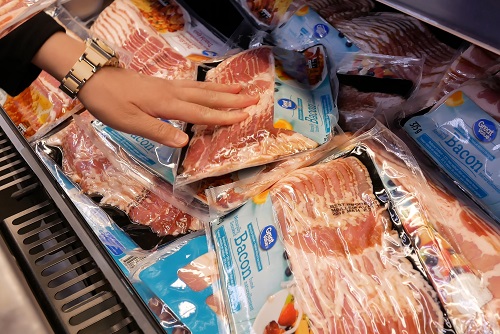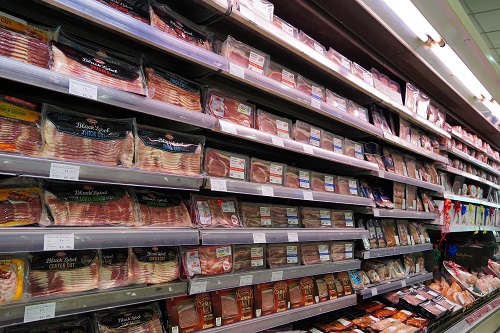What’s the deal with deli and processed meats? They are a staple in sandwiches. Plus, they are convenient and taste good. But is it true that they are dangerous for our health? Let’s see what the experts are saying.
What are deli and processed meats?
Deli and processed meats include any meats that have been smoked, cured/salted, or preserved in another way. This could include:
- Cold cuts that can be eaten out of the package, such as salami, pepperoni, and bologna
- Hot dogs
- Sausages
- Bacon
- Ham and corned beef
These foods are processed meats because of the steps taken to preserve or flavor them. UGA SNAP-Ed believes that a healthy diet has room for all types of foods (including processed foods—check out our blog on Processed Foods and Your Health). However, limiting intake of processed meats is recommended by health experts. [1]

What are the concerns with deli and processed meats?
Deli and processed meats make eating protein more convenient. To make them convenient options, ingredients like sodium, nitrates (n-eye-tray-ts), and nitrites (n-eye-try-ts) might be added. Without these ingredients, meats might not be as safe to eat, or they will have a bland color or flavor. Unfortunately, high amounts of these ingredients are not optimal for health. [2]
Here’s what we know right now:
- Sodium: Used for preservation (curing) and flavor. We know that high amounts of sodium are linked to high blood pressure and heart disease. [3] It’s a good idea to check the nutrition facts label for sodium content. Use our Food Label Facts blog to help you!
- Nitrates: Used for preservation, food safety, color, and flavor. Found naturally in plants and protects meats against bacteria that can cause illnesses, such as botulism. Nitrates can turn into nitrites. [4]
- Nitrites: Used for preservation, food safety, color, and flavor. Some research suggests that nitrates and nitrites found in processed meats are linked to an increased risk of colon cancer. [4] [5]
- Saturated fat: Though not used for preservation, many processed meats are made from sources with higher amounts of saturated fat. Eating too much saturated fat each day can lead to heart disease. [6] Check the nutrition facts label for saturated fat content.

Does an “All Natural” or “Nitrate/Nitrite Free” label make processed meats safer?
Many companies will use labels like these to make their products look like the “better” option. Unfortunately, the label “All Natural” has no legal definition. A label like this could be saying the product does not include some ingredients like man-made nitrates. This alone does not indicate safety or health. [4]
The “Nitrate/Nitrite Free” or “No Nitrates or Nitrites Added” claims are sneaky. These labels can be used as long as the company did not add man-made nitrates to the product. You might see something labeled “Nitrate/Nitrite Free,” and a disclaimer that says, “Except for what naturally occurs in celery powder.” This is because some plants, like celery, contain nitrates. They still act as preservatives for the meat by becoming nitrites. [5]
It is unclear if naturally occurring nitrates are any safer for our health. This is because they might turn into the same harmful substance in our bodies. Even if a processed meat does not have nitrates or nitrites, it may have been smoked or cured with salt. These preserving methods may still increase colon cancer risk. [5]

Settle the debate: cut out all processed meats?
Nutrition scientists are still learning more about processed meats. In the meantime, we can choose to limit the total amount of these foods we eat regularly.
The American Institute for Cancer Research recommends we eat no more than 12-18 ounces of red and processed meat per week. That breaks down to about 3 portions a week, each being around the size of a deck of cards. A little bit of processed meat here and there is okay!
To scale back on your deli and processed meat intake, try these yummy alternatives most of the time:
- Sandwiches made with canned tuna, chicken, or salmon (packed in water!). Our Curry Chickpea Sandwich is a tasty option, too!
- Repurpose leftovers with our Spice up your Leftovers blog! Find ways to use leftover proteins in tomorrow’s lunch.
- Try different protein sources: eggs, fresh chicken or fish, hummus, and dairy.
- Swap out bacon, chorizo, or breakfast sausage with spicy vegetarian sausages. Be sure to flip the package over to check for sodium on the nutrition facts label.
- Replace sausage in a recipe with beans like kidney beans, chickpeas, and lentils for a plant-powered, protein punch. This Rustic Rotini with Tomatoes and Beans recipe may become a family favorite!
There is a connection between processed meats and disease, but the debate isn’t over yet. For now, swapping out most processed meats for fresh or plant-based options will help lower your risk. When you do buy processed meats, shop smarter by looking at the sodium content and focus less on the “too good to be true” labels!
Written by Melanie Ng, Ph.D. Candidate | Edited by Leslie Davis, MS, RD, LD, CDCES and the Nutrition Education Team
Posted: July 31, 2021
[1] American Institute for Cancer Research—Processed Meat
[2] American Cancer Society—Processed Meats
[4] Today’s Dietitian—Meat Snack Fervor
[5] American Institute for Cancer Research—Hot Dogs, Bacon, Celery Powder, and Cancer Risk
